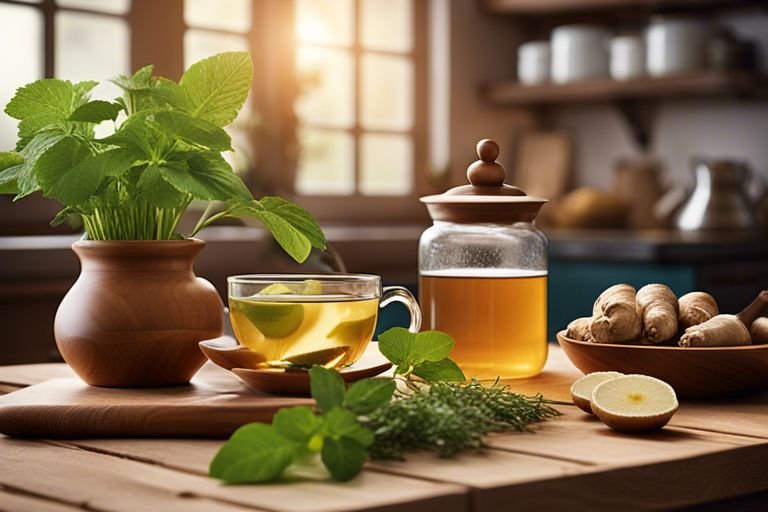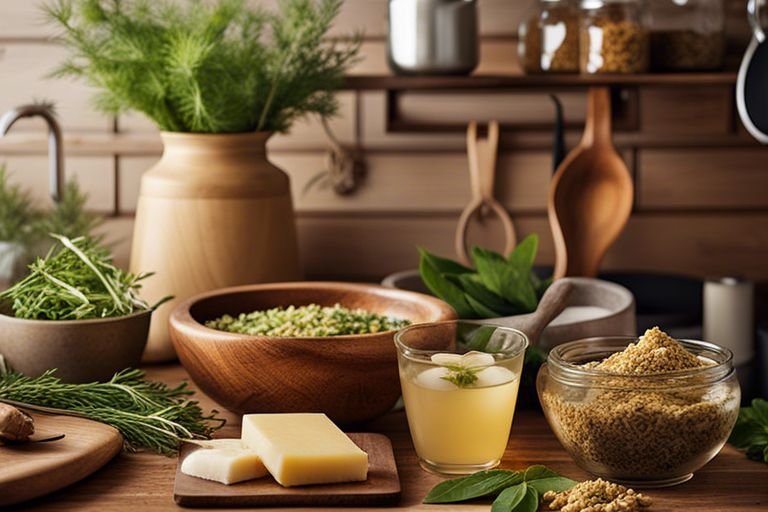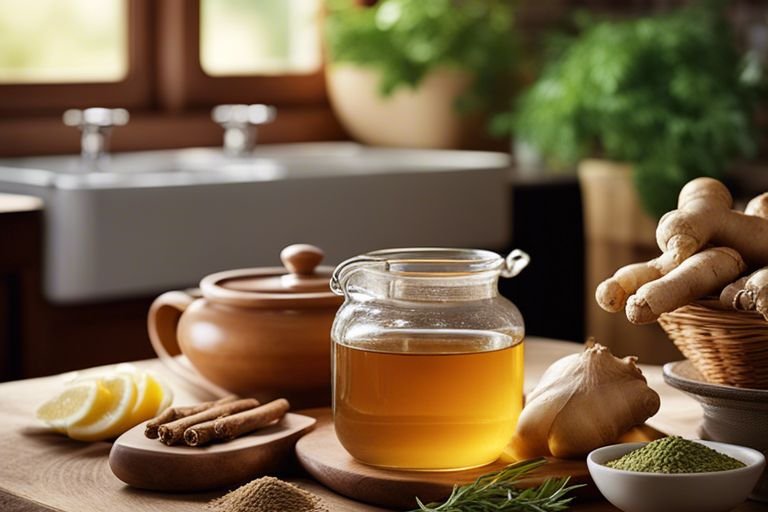Many people struggle with digestive issues, often seeking effective and natural solutions. In this post, you will discover how simple ingredients like ginger, peppermint, and other herbal remedies can significantly improve your digestive health. By incorporating these natural options into your daily routine, you can alleviate discomfort and promote a healthier gut. Read on to explore how these remedies can work for you and enhance your overall well-being.
Key Takeaways:
- Ginger: Known for its anti-inflammatory properties, ginger can help alleviate nausea and improve overall digestion.
- Peppermint: Effective at soothing digestive issues, peppermint can relieve bloating and gas by relaxing the digestive tract muscles.
- Herbal Teas: Incorporating herbal teas with ginger and peppermint can provide calming effects and promote better digestive health.
- Dietary Balance: Combining ginger and peppermint with a balanced diet rich in fiber can significantly enhance digestive function.
- Natural Alternatives: Utilizing natural remedies like ginger and peppermint can be a gentle approach to managing digestive discomfort without relying on pharmaceuticals.
Understanding Digestion
Before you can fully appreciate the natural remedies for digestion, it’s crucial to understand how your body processes food. The digestive system is a complex network that plays a critical role in breaking down the food you consume into crucial nutrients, which your body then uses for energy, growth, and cellular repair.
The Digestive System Overview
Overview of the digestive system begins with the mouth, where digestion actually starts. As you chew your food, enzymes in your saliva kick into gear, beginning the breakdown process. The food then travels down the esophagus and into the stomach, where it is mixed with gastric juices. This combination results in the food being broken down into a semi-liquid substance called chyme.
Once chyme leaves your stomach, it enters the small intestine, which is where most nutrient absorption occurs. The walls of the small intestine are lined with tiny villi that increase the surface area for absorption. After nutrients are absorbed, the remaining waste moves into the large intestine, where water is reabsorbed, and the remaining waste is prepared for elimination.
Common Digestive Disorders
On the other hand, various digestive disorders can impede your system’s ability to function properly. Conditions like irritable bowel syndrome (IBS), gastroesophageal reflux disease (GERD), and inflammatory bowel disease (IBD) can significantly impact your quality of life and hinder your digestive health.
These disorders can result in symptoms ranging from discomfort and bloating to more severe issues like chronic diarrhea or constipation. Understanding the triggers for these conditions can empower you to make informed dietary and lifestyle changes that can significantly improve your digestive health.
With a growing number of individuals experiencing digestive issues, it’s crucial to recognize that these disorders often stem from lifestyle choices, dietary habits, and stress levels. Factors such as a high-fat diet, processed foods, and insufficient hydration can contribute to the onset of digestive disorders. By identifying these triggers and making targeted changes, you can enhance your digestive well-being.
The Role of Diet in Digestion
On top of understanding the physical aspects of digestion, it’s important to consider the role that your diet plays. The foods you consume can either promote a healthy digestive system or contribute to its dysfunction. A diet rich in fiber, for example, aids in regular bowel movements and helps maintain a balanced gut microbiome.
Furthermore, incorporating probiotics through foods like yogurt or fermented items into your diet can support the growth of beneficial bacteria, further enhancing your digestive health. Being mindful of your diet not only helps expedite digestion but also ensures that your body absorbs the maximum nutrients necessary for optimal health.
Role of your diet extends beyond just what you eat; it encompasses how you eat as well. Paying attention to portion sizes, not rushing through meals, and avoiding heavy meals late in the evening can all aid in better digestion. Understanding these facets allows you to make more informed choices, leading to a healthier digestive system.

Ginger: A Powerful Digestive Aid
Any discussion about natural remedies for digestive health would be incomplete without mentioning ginger. This remarkable root not only adds a zingy flavor to your meals but also offers a plethora of health benefits, particularly for your gut. If you’re curious about how ginger and other spices contribute to digestive wellness, be sure to check out the 9 Super Herbs and Spices for Gut Health. Ginger’s long-standing reputation as a digestive aid comes from its complex compounds that work synergistically to calm your stomach and enhance digestive function.
Anti-Inflammatory Properties
Anti-inflammatory effects are one of ginger’s standout qualities. The bioactive components, such as gingerol, help to reduce inflammation in the gastrointestinal tract. This property can be particularly beneficial for individuals suffering from conditions like gastritis and inflammatory bowel disease, which may impact your ability to digest food effectively. By reducing inflammation, ginger may allow you to enjoy a more comfortable digestive experience.
Furthermore, the reduction of inflammation in your stomach can pave the way for improved nutrient absorption. Inflammation often hinders the gut’s ability to absorb nutrients efficiently, leading to deficiencies and discomfort. Thus, incorporating ginger into your daily routine may not only relieve your immediate digestive issues but can also promote better long-term digestive health.
Stimulation of Digestive Enzymes
Stimulation of digestive enzymes is another key benefit provided by ginger. The compounds found in ginger can stimulate the production of several vital digestive enzymes, enabling your body to break down food more efficiently. By enhancing your digestive enzyme activity, ginger can help you prevent bloating and indigestion, allowing you to feel lighter and more energetic after meals.
Another important aspect of stimulating digestive enzymes is the role they play in maintaining gut health. An increase in enzyme production can lead to a more balanced gut microbiome, which is necessary for overall digestive health. Keeping your digestive system functioning optimally ensures that your body absorbs nutrients effectively, helping to fuel your daily activities and maintain your well-being.
Efficacy in Reducing Nausea
To address the issue of nausea, ginger has been shown to be highly effective. Whether you experience motion sickness, morning sickness, or nausea caused by chemotherapy, ginger can help alleviate these feelings. Its natural compounds work to mute the signals in your brain that lead to nausea, providing you with relief without the side effects often associated with over-the-counter medications.
Digestive discomfort, such as nausea, can significantly affect your quality of life. By including ginger in your diet—whether through ginger tea, supplements, or incorporating it into your cooking—you may find a safe, simple solution to bolster your digestive health while mitigating nausea. This rhizome has not only been researched but is also celebrated in folklore for its ability to enhance not just digestion but overall well-being. Embrace the powers of ginger, and you could improve not just your gut function but your daily comfort, too.

Peppermint: A Cool Solution for Digestion
To understand how peppermint can serve as an effective remedy for digestion, consider its long-standing history in traditional medicine. This herb is renowned for its ability to soothe the stomach and ease digestive discomfort. You can explore more about various home remedies, including peppermint, by reading this insightful article on Home remedies to treat digestive issues: Fennel seeds, ginger tea, mint leaves, and more. The cooling properties of peppermint make it an excellent choice for enhancing your digestive health, especially when it comes to reducing bloating and gas.
Antispasmodic Effects
On the subject of digestive woes, peppermint has demonstrated remarkable antispasmodic effects. This means that it can help alleviate spasms in the smooth muscles of your gastrointestinal tract. By relaxing these muscles, peppermint not only eases discomfort but also promotes a smoother passage of food through your digestive system. This makes it especially beneficial for individuals experiencing cramping or tension in their abdominal area.
Furthermore, when you consume peppermint, it triggers the bile to flow, which is crucial for digesting fats effectively. The cooling sensation you sometimes feel in your stomach after a peppermint tea is a sign of its soothing capability, making it a go-to remedy for those who often find themselves dealing with digestive troubles.
Alleviating Symptoms of Irritable Bowel Syndrome (IBS)
The benefits of peppermint extend to individuals suffering from Irritable Bowel Syndrome (IBS), a common gastrointestinal disorder characterized by symptoms like bloating, abdominal pain, and changes in bowel habits. Studies have shown that peppermint can significantly reduce these symptoms by relaxing the intestinal muscles and alleviating cramping. Its natural anti-inflammatory properties also help to soothe the lining of the gut, providing further relief.
Bowel movements can become less erratic, and you may find that your digestive system operates more smoothly when you incorporate peppermint into your daily routine. Whether it’s through a soothing cup of peppermint tea or a topical application of peppermint oil, you will likely notice an improvement in your overall digestive health.
Peppermint Oil vs. Peppermint Tea
Antispasmodic effects can be obtained from both peppermint oil and peppermint tea, but they do have some differences worth considering. Peppermint oil is more concentrated and can provide quicker relief from digestive discomfort due to its potent compounds. When used topically or in aromatherapy, it can help in reducing symptoms swiftly. However, it is important to use peppermint oil correctly, as undiluted forms can cause irritation or adverse reactions when applied to the skin.
On the other hand, consuming peppermint tea is gentler on your digestive system. It provides a soothing effect while also being hydrating, which can help your body process food more efficiently. Both forms have their unique benefits, so depending on your needs and preferences, you may find one more effective than the other.
Digestion can be greatly enhanced when you harness the powers of peppermint in your routine. Deciding whether peppermint oil or tea suits you best can empower your digestive health and help you maintain comfort throughout your day.
Other Natural Remedies to Consider
Now that you’ve explored ginger and peppermint, it’s crucial to consider other natural remedies that can bolster your digestive health. These options offer unique properties that can help alleviate various digestive issues, from bloating to inflammation. Incorporating these remedies into your routine might enhance your overall well-being while ensuring your digestive system functions effectively.
Chamomile: A Soothing Herbal Option
Soothing and gentle, chamomile is renowned for its calming effects on both the body and mind. This herbal remedy is particularly effective in alleviating digestive discomfort, including indigestion and gas. Drinking chamomile tea can provide you with a sense of relief after a heavy meal, making it an ideal addition to your digestive toolkit. Furthermore, its anti-inflammatory properties can help soothe an upset stomach and reduce irritation in the digestive tract.
In addition to its digestive benefits, chamomile can also promote relaxation, which is vital for digestion. Stress often exacerbates digestive issues, so taking a moment to unwind with a warm cup of chamomile tea can offer double benefits. By integrating chamomile into your daily routine, you may find that you not only improve your digestion but also enhance your overall sense of well-being.
Fennel: Reducing Bloating and Gas
With its sweet, licorice-like flavor, fennel is well-known for its ability to reduce bloating and gas. This aromatic herb has been used for centuries to promote healthy digestion and alleviate gastrointestinal discomfort. Chewing on fennel seeds after a meal can help release enzymes that support digestion and minimize gas production in your gut. Additionally, fennel tea can serve as a delightful way to enjoy its benefits while soothing your tummy.
For instance, fennel contains compounds such as anethole, which can help relax your intestinal muscles, allowing trapped gas to escape more easily. This action can be particularly beneficial for individuals who often experience bloating after meals. By adding fennel to your digestive support routine, you may discover a natural and effective means for maintaining your comfort and easing digestive distress.
Turmeric: The Anti-Inflammatory Spice
Herbal enthusiasts often praise turmeric for its powerful anti-inflammatory properties, making it an excellent choice for promoting digestive health. Curcumin, the active compound in turmeric, has been shown to help prevent and manage various gastrointestinal issues, including irritable bowel syndrome (IBS) and inflammatory bowel disease (IBD). Including turmeric in your diet can not only provide flavor to your meals but also support the overall health of your digestive system.
Plus, incorporating turmeric into your diet may enhance nutrient absorption, ensuring your body effectively utilizes the vitamins and minerals from the food you consume. You can easily add turmeric to your cooking or enjoy it in a soothing golden milk or turmeric tea. By embracing this vibrant spice, you can proactively support your digestive health while adding some zest to your culinary endeavors.

Incorporating These Remedies into Your Diet
Your journey towards better digestion can be more enjoyable with a few simple recipe modifications and creative ways to incorporate natural remedies like ginger and peppermint into your daily meals. Not only do these ingredients enhance your digestive health, but they also add exciting flavors and aromas to your dishes. The recipes below will help you embrace these powerful remedies while tantalizing your taste buds.
Delicious Recipes Featuring Ginger
Any fan of ginger knows how versatile this warming spice can be. To enjoy its digestive benefits, consider whipping up a ginger-infused herbal tea. Simply steep a few slices of fresh ginger in hot water for about 10-15 minutes, and add a touch of honey and lemon juice for extra flavor and health benefits. You can also incorporate ginger into savory meals; try adding grated ginger to your stir-fries or marinades for meats and vegetables, which will not only help digestion but also provide a hint of zest.
Another delightful recipe is ginger and carrot soup. Infuse your broth with ginger, carrots, onions, and garlic, and blend until smooth. This creamy soup supports digestion while offering a comforting, nutritious option on chilly days. You can top it off with a sprinkle of pumpkin seeds or fresh herbs for added texture and flavor. These delicious dishes allow you to savor the many benefits of ginger while enjoying family meals.
Ways to Enjoy Peppermint
An easy and refreshing way to enjoy peppermint is through herbal teas. You can steep dried peppermint leaves in hot water for an uplifting cup that helps soothe your digestive system. If you’re looking for something a bit colder, consider making peppermint-infused iced tea or blending fresh mint leaves into a smoothie for a refreshing twist. You can also incorporate peppermint into your desserts—think peppermint bark or a sprinkle of peppermint on top of yogurt or ice cream for a light yet invigorating finish to your meal.
The versatility of peppermint makes it a delightful addition to your daily routine, whether it’s as a fresh garnish or a main component in dishes. You can even grow your own peppermint plant, which allows you to have fresh leaves at your disposal for all your culinary adventures.
How to Combine Multiple Remedies
Your digestive journey doesn’t have to rely solely on one remedy; combining ginger and peppermint can enhance their benefits and provide a holistic approach to digestion. Start by considering ways to integrate both ingredients into your meals. For instance, you can create a ginger-peppermint tea blend that offers a unique flavor profile while promoting digestive health. Another approach is to add ginger and peppermint to your smoothies, where the blend of flavors balances beautifully and provides both warmth and coolness.
In addition to drinks, try incorporating both ingredients into savory dishes. A stir-fry with ginger, vegetables, and a sprinkle of fresh peppermint leaves adds a delightful twist and presents a creative way to enjoy their benefits. Remember that moderation is key, so maintain a balance between these powerful remedies, ensuring your body reaps the rewards without overwhelming it.
These creative combinations not only provide digestive support but also keep your meals exciting and nutritious. Keep experimenting with different ratios and recipes, and discover what flavors you enjoy best, knowing that you’re taking a proactive approach to enhancing your digestive health.
Potential Side Effects and Considerations
Once again, while natural remedies such as ginger and peppermint can significantly improve your digestion, it’s crucial to consider potential side effects and who should approach these remedies with caution. Understanding your body’s unique chemistry will empower you to make well-informed choices about what you consume for digestive health.
Ginger: Who Should Use Caution?
Effects of ginger can vary from person to person. For most individuals, ginger is well-tolerated and offers numerous health benefits. However, if you have certain conditions—such as gallstones, a bleeding disorder, or are on anticoagulant medications—you may need to exercise caution. High doses of ginger can lead to gastrointestinal discomfort, including bloating or gas, and may cause heartburn in some people.
Also, pregnant women should consult their healthcare provider before incorporating ginger into their diet, as high amounts can induce contractions. If you are already taking medications for managing blood sugar or blood pressure, incorporating ginger might influence how those medications work, warranting a discussion with your doctor.
Peppermint: When It Might Not Be Suitable
Caution is warranted when considering peppermint, particularly for individuals with specific gastrointestinal disorders. Those who suffer from gastroesophageal reflux disease (GERD) may find that peppermint exacerbates their symptoms, as it can relax the lower esophageal sphincter and lead to increased acid reflux. Additionally, if you’re experiencing constipation, peppermint may not be suitable, as it can sometimes slow down digestion.
It’s important to listen to your body’s signals. If you notice that peppermint tea or oil leads to discomfort or worsens your symptoms, it may be time to reevaluate whether it’s beneficial for you.
Interactions with Medications
The interactions of these herbs with medications can also pose risks. Ginger may increase the effects of blood-thinners, thereby elevating the risk of bleeding. It’s crucial to communicate with your healthcare provider if you are taking anticoagulant medications, as your doctor may recommend monitoring your ginger intake closely. On the other hand, peppermint oil may interact with certain medications that are metabolized by the liver, potentially altering their effectiveness.
Additionally, you should discuss the use of peppermint if you are on medications for high blood pressure, as it can have a negative interaction, impacting your cardiovascular health. Always consult with your healthcare provider before adding these remedies to your regimen, particularly if you are managing chronic health issues or taking multiple medications.
Potential risks are, therefore, crucial to consider. Awareness of how natural remedies like ginger and peppermint might interact with your personal health context will ensure you reap their benefits without unwanted side effects.
Summing up
Summing up, incorporating natural remedies like ginger and peppermint into your daily routine can significantly enhance your digestive health. These remedies provide not only comfort from occasional digestive discomfort but also promote healthier digestive processes overall. By understanding how these ingredients work—increasing bile production, soothing the stomach lining, or easing spasms—you can make informed choices that cater to your specific needs. Keep in mind, these natural options complement a balanced diet and should be part of a holistic approach to your health.
As you explore the benefits of ginger, peppermint, and other natural remedies, it’s important to listen to your body and pay attention to how these substances affect your digestion. You might find that a simple cup of peppermint tea after meals or incorporating ginger into your cooking can lead to noticeable improvements in your comfort and overall well-being. By taking control of your digestive health through these natural remedies, you’ll be empowered to enjoy a more balanced and fulfilling lifestyle.
FAQ
Q: What are the key benefits of using ginger for digestion?
A: Ginger is known for its anti-inflammatory properties, which can help soothe the stomach and reduce symptoms of indigestion. It stimulates saliva production, bile secretion, and gastric enzyme activity, all of which aid digestion. Additionally, ginger may help alleviate nausea and bloating, contributing to a more comfortable digestive process.
Q: How does peppermint aid in digestion?
A: Peppermint contains menthol, which has a calming effect on the muscles of the gastrointestinal tract. This relaxation can help relieve symptoms like bloating, gas, and cramping. Moreover, peppermint can enhance the flow of bile, facilitating the digestion of fats, and may also reduce feelings of nausea, making it useful for those with sensitive stomachs.
Q: Are there any side effects associated with ginger and peppermint?
A: While both ginger and peppermint are generally safe for most people, excessive consumption may lead to side effects. Ginger may cause heartburn, diarrhea, or stomach upset in high doses. Peppermint can exacerbate acid reflux in some individuals and might cause allergic reactions in rare cases. It’s always advisable to consult with a healthcare professional before starting any new remedy.
Q: Can I combine ginger and peppermint for digestive health?
A: Yes, combining ginger and peppermint can enhance their individual benefits and create a powerful natural remedy for digestion. Making a tea that includes both ingredients can soothe the digestive system and provide relief from discomfort. However, moderation is key, so starting with small amounts to assess tolerance is recommended.
Q: How can I incorporate ginger and peppermint into my daily routine?
A: There are several ways to include ginger and peppermint in your daily routine. You can brew ginger tea by steeping fresh ginger slices in hot water, add peppermint leaves to enhance flavor and benefits, or use ginger powder and peppermint oil in cooking. Additionally, ginger candies, peppermint tea, or herbal supplements are widely available for convenient use.

